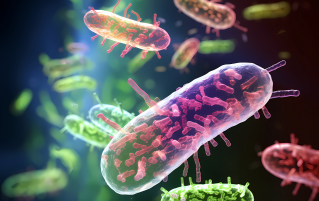

Before you start revising some of the required practicals in your GCSE’s, one of which investigates preventing bacterial growth – have a look at how useful bacteria can be.
When bacteria are mentioned, people usually imagine disease. However, bacteria are incredibly important to us, and the planet. They may well be the solution to many modern-day problems, such as reducing climate change, and lowering our carbon footprint when producing food!
You may already be aware that trillions of beneficial bacteria live in our bodies, helping to keep us healthy. They assist us in extracting energy from food, and even protect us from disease-causing bacteria. But scientists believe bacteria can help us, not only as individuals, but as a population. They could actually help produce enough food for the ever growing population. Bacteria, known as “hydrogenotrophs” change carbon dioxide into proteins which we can eat. You will have learned in science lessons that plants use energy from the sun to photosynthesise. But they are only able to do so because, many years ago, they incorporated photosynthetic bacteria into their cells. Chloroplasts, are descendants of these bacteria. If scientists can find a way to use solar electricity in order to help the bacteria produce proteins faster, food production could be more efficient than ever!
Bacteria could also play a huge role in limiting climate change. They will take in carbon dioxide from the atmosphere, but unfortunately they do this very slowly. Species of bacteria exist which are faster-growing, but they would rather eat sugar than carbon dioxide. Promisingly, scientists have managed to turn a fast-growing species of bacteria into a carbon dioxide feeder! The newly evolved bacteria could be 10 times more effective at removing carbon dioxide from the atmosphere than photosynthesis.
For GCSE Science – you need to be able to explain how to investigate how antiseptics and antibiotics prevent bacterial growth. It is one of the required practicals you must revise for AQA Paper 2.
For help with this try our new guides “How to work with Required Practicals: Part 4 and Part 5”.
Part 4 focuses on the Biology practicals needed for Combined Science and Biology Paper 2 (AQA). Included in Part 5 are all the additional practicals needed on both papers for AQA Biology.
Part 4 includes: Reaction Times, Investigating Population Size
Part 5 includes: Preventing Bacterial Growth, Plant Response, Decay
